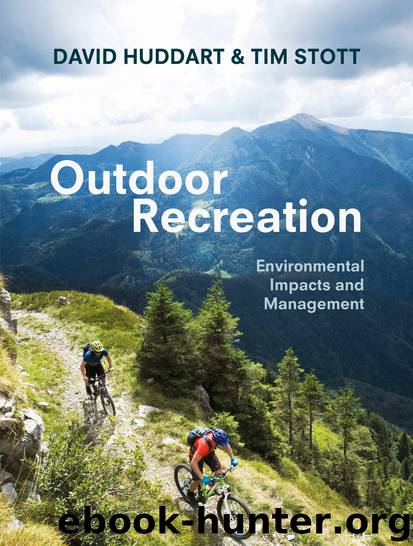Outdoor Recreation by David Huddart & Tim Stott

Author:David Huddart & Tim Stott
Language: eng
Format: epub
ISBN: 9783319977584
Publisher: Springer International Publishing
9.6 Horses As Agents of Weed Spreading
Manure acts as a favourable growing site and seems an ideal substrate for seedling germination in a controlled laboratory setting (e.g. Weaver and Adams 1996; Törn et al. 2009), and there is no reason to suppose that this should not apply to trails, apart from the factor of constant disturbance. It therefore seems possible that horses can act as shuttles for non-native seeds by consuming them from pasture and transporting them to a new plant community where they could germinate and grow. Seeds from hay could be transported, and it has been shown that horses that consistently consume hay transport more seeds through their manure than by their coats or hooves (Gower 2008). Weaver and Adams (1996) recorded 29 species from three national parks in the USA, and 17 weed species were recorded from track verges and two holding yards. The difference between tracks and verges may be due to the continued churning of the tracks by the horses, whilst Liddle and Chitty (1981) suggested that the lack of water may be the factor inhibiting establishment in drier environments. The sources of potential weed seeds include both local pastures and dried stock feeds which may be rich in weed seeds. After a review of the literature, Pickering et al. (2010) listed 189 seed species which have been found on the coats of horses (epizoochory) or germinated from horse manure (endozoochory). So it is not just horse manure which may be important here, and in Belgium Couvreur et al. (2004) studied 6385 seeds which germinated from 75 species which had been brushed from the coats of 201 horses, donkeys, and Galloway cattle in 27 nature reserves. They concluded that these animals were important dispersers of many plant species by seasonal grazing in different reserves, and that they function as “mobile link organisms” which connect isolated nature reserves through seed dispersal. This possibly influences vegetation development and the long-term survival of plant populations.
Results from Quinn et al. (2008, 2010) and others clearly indicate that seeds are capable of germination in greenhouse conditions after digestion by horses. Van Dyk and Neser (2000) found that the critical time for the dispersal of seeds via faeces was 18–48 hours after ingestion of feed containing seeds, when caution should be exercised when taking horses into sensitive areas. However, immersion of seeds in seawater did not affect the ability of seeds that had passed through the gut of horses to germinate. In fact the ability to germinate after having been exposed to digestive fluids seemed to be enhanced, since swelling of seeds and rupturing of the testa were observed.
More work is required to determine the importance of horses as potential weed dispersal vectors in field conditions, but the fact that weed germination has been documented should caution owners to carefully select feed sources free of weeds before bringing horses onto trails. Yet trails probably provide environments suitable for the establishment of many weed species regardless if they come from horse manure as the primary agent of transport.
Download
This site does not store any files on its server. We only index and link to content provided by other sites. Please contact the content providers to delete copyright contents if any and email us, we'll remove relevant links or contents immediately.
The Lonely City by Olivia Laing(4801)
Animal Frequency by Melissa Alvarez(4471)
All Creatures Great and Small by James Herriot(4322)
Walking by Henry David Thoreau(3962)
Exit West by Mohsin Hamid(3827)
Origin Story: A Big History of Everything by David Christian(3692)
COSMOS by Carl Sagan(3624)
How to Read Water: Clues and Patterns from Puddles to the Sea (Natural Navigation) by Tristan Gooley(3469)
Hedgerow by John Wright(3362)
How to Read Nature by Tristan Gooley(3341)
The Inner Life of Animals by Peter Wohlleben(3319)
How to Do Nothing by Jenny Odell(3302)
Project Animal Farm: An Accidental Journey into the Secret World of Farming and the Truth About Our Food by Sonia Faruqi(3221)
Origin Story by David Christian(3201)
Water by Ian Miller(3185)
A Forest Journey by John Perlin(3075)
The Plant Messiah by Carlos Magdalena(2934)
A Wilder Time by William E. Glassley(2863)
Forests: A Very Short Introduction by Jaboury Ghazoul(2842)
